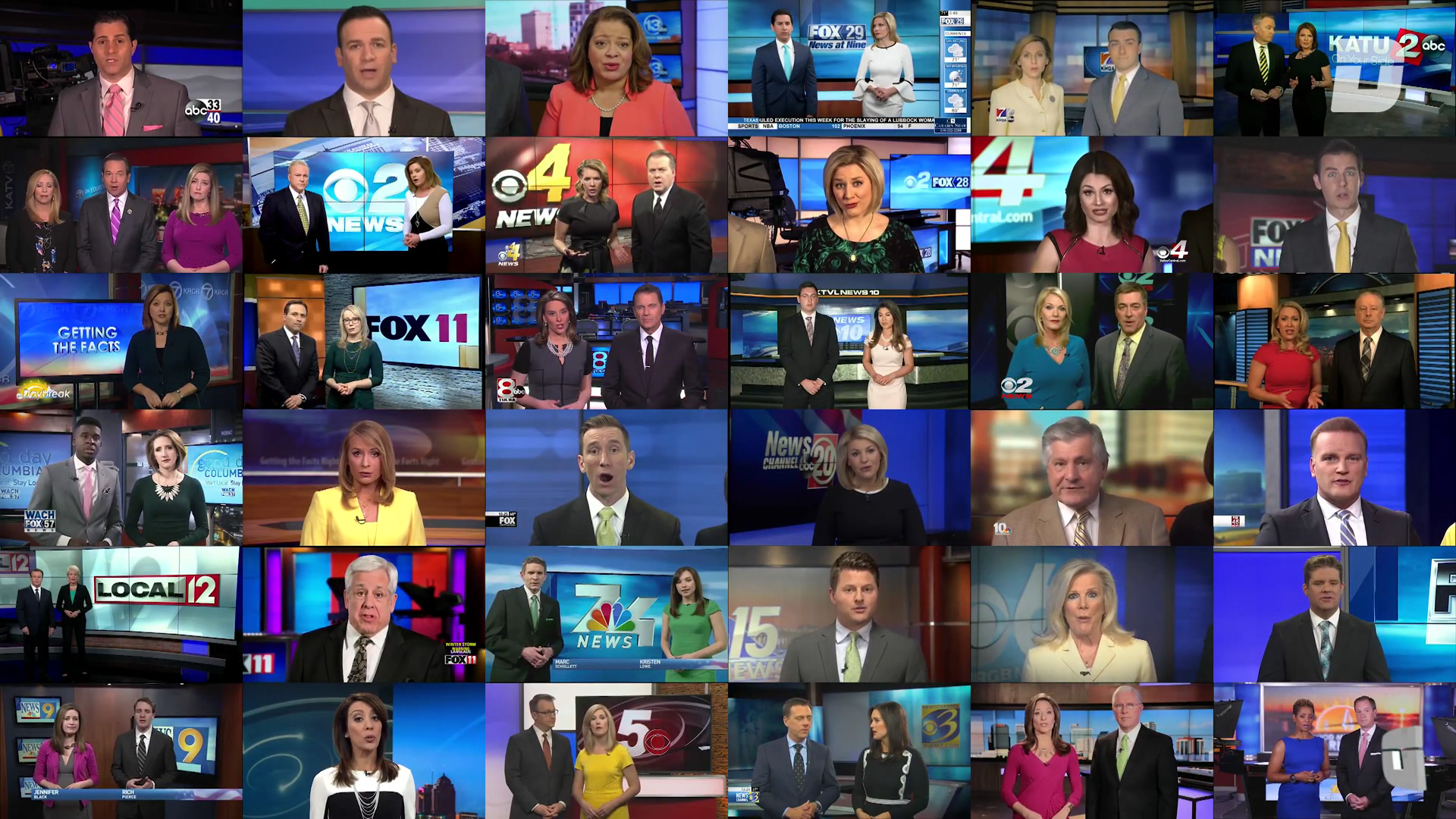This past weekend, the fine folks over at ThinkProgress and Deadspin did Americans a great service when they each posted frightening videos showing anchors of a plethora of Sinclair-owned television stations across the country reading off the same Trumpian script on orders from their corporate overlords in Hunt Valley, Maryland, where Sinclair is headquartered.

The videos have become a sensation and have been viewed by millions, drawing reactions from many elected officials and celebrities.
“News anchors looking into camera and reading a script handed down by a corporate overlord, words meant to obscure the truth not elucidate it, isn’t journalism. It’s propaganda. It’s Orwellian,” tweeted Dan Rather. “A slippery slope to how despots wrest power, silence dissent, and oppress the masses.”
“This is extremely dangerous to our democracy,” agreed Jimmy Kimmel, whose show airs in late night on many of Sinclair’s stations.
Rarely have we seen a pair of videos that so powerfully demonstrate the terrible harm that comes from unchecked media consolidation and concentration in our country, a highly destructive trend that has been continuing unabated for years, resulting in fewer journalists, fewer newsrooms, and fewer local owners.
Sinclair — which HBO host John Oliver calls the largest media conglomerate you’ve never heard of — owns dozens upon dozens of local television stations across the country, including several in the Pacific Northwest it acquired when it bought up Fisher Broadcasting in 2013. NPI opposed Fisher’s sale to Sinclair, but regrettably, the acquisition was approved by the Obama administration.
Fisher is thus no more, and its stations, Seattle’s KOMO and Portland’s KATU among them, are now cogs in Sinclair’s machine. Not only are they forced to carry the right wing propaganda produced out of Sinclair HQ, management occasionally tries to skew their news coverage. The Seattle Times’ Mike Rosenberg explains:
KOMO journalists say it is rare for Sinclair to give them story assignments.
But they occasionally happen. Two KOMO journalists recalled a Seattle Times editorial that railed against the Sinclair purchase of KOMO in 2013. Sinclair then immediately told KOMO to run a “smear” piece on the Times, the KOMO staffers said. (The story as envisioned never ran; staffers say they refused to do it, but KOMO did run a piece on the decline of newspapers around that time).
Another former KOMO staffer recalled submitting a story about a Seattle City Council vote over a non-essential project requiring taxpayer funds. They interviewed several people during “man on the street” reporting and found no one was against the funds being used.
But the KOMO director in charge said Sinclair had encouraged reporters to find opposition when covering those types of stories, to pump up the idea of taxpayer waste.
The KOMO director said, “Corporate is watching, and they need this angle,” a former KOMO staffer who worked on the story said. “And I wouldn’t do it. It’s completely planting the news.”
The worst, some KOMO staffers fear, is yet to come. One told Rosenberg:
“We have midterms coming up,” a journalist there said, referring to the November elections. “Who’s to say what’s going to come from (Sinclair) when that rolls around. This is not going to be the last effort by corporate to try to disseminate their message.”
https://thinkprogress.org/sinclair-forces-reporters-to-read-script-about-fake-news-63ae6fcea30e/
America’s airwaves are part of its commons and belong to the public, but you wouldn’t necessarily know that by looking at the media landscape we have.
Sinclair has been allowed by the our government to control way too much of our public airwaves. And right now, Sinclair is trying to get even bigger. It wants to buy out Tribune and add a choice group of television stations to its portfolio.
That planned acquisition should be blocked (as should AT&T’s proposed deal for Time Warner), and Sinclair should be broken up as part of a trustbusting campaign to diversify our country’s media ownership along with Disney, Comcast (which owns NBCUniversal), CBS, Twentieth Century Fox, and other large media conglomerates.
It must be noted that unchecked media consolidation isn’t just bad for traditional forms of media like newspapers, television, and radio. Big media is also a serious threat to Internet freedom. The bigger big media gets, the more influence it has, and the more concentrated ownership of digital properties get.
The Internet is not immune to the harms caused by media concentration, and it will not save us from a future in which programming and editorial decisions are dictated by a small number of wealthy, powerful people who are primarily concerned about their corporate bottom lines as opposed to the well-being of the country.
That is why action must be taken to break up companies like Sinclair. America needs a twenty-first century update of its antitrust laws to get the ball rolling, and that should be one of the first orders of business under a newly-elected Democratic Congress, should voters choose to fire the Republicans this autumn.

